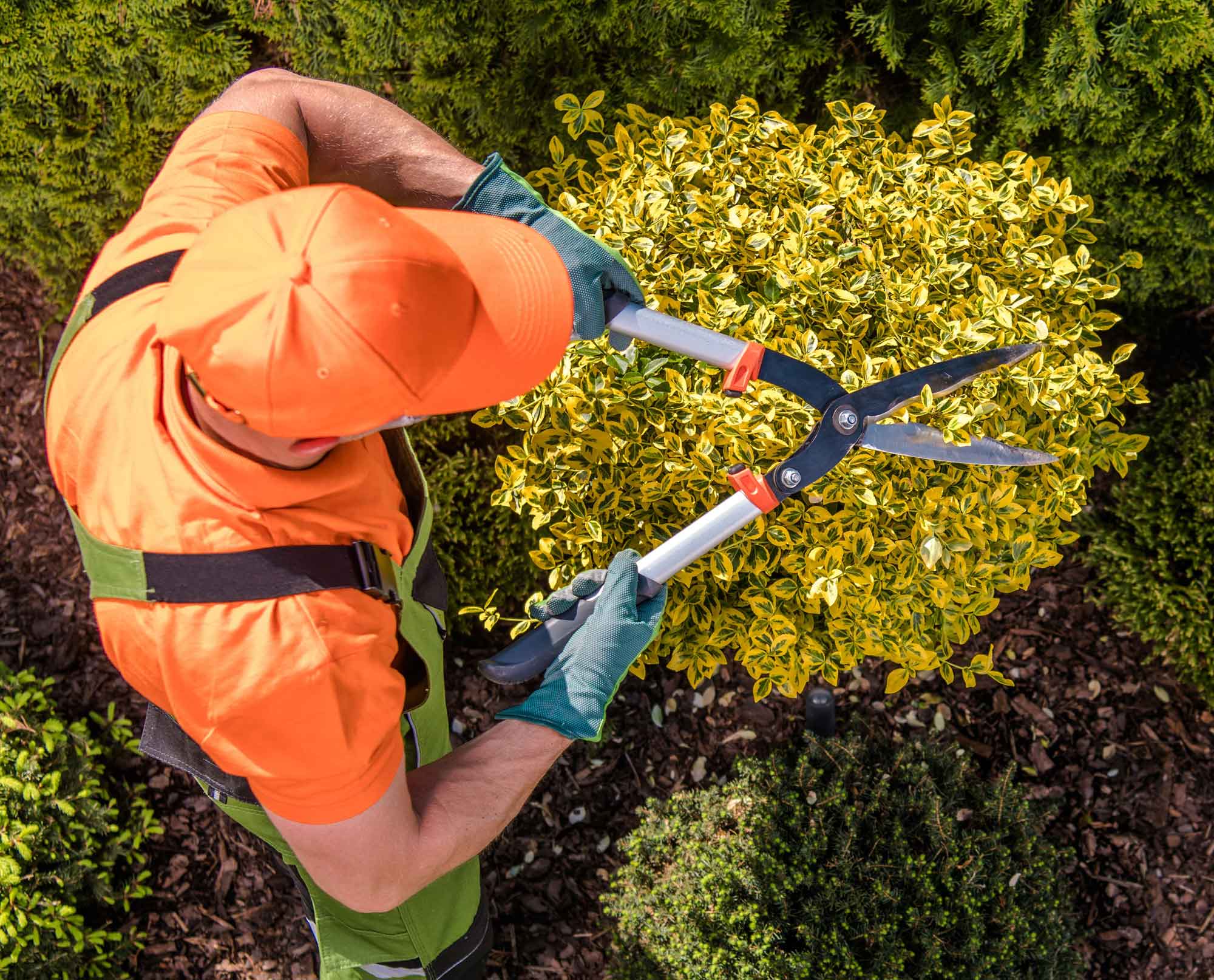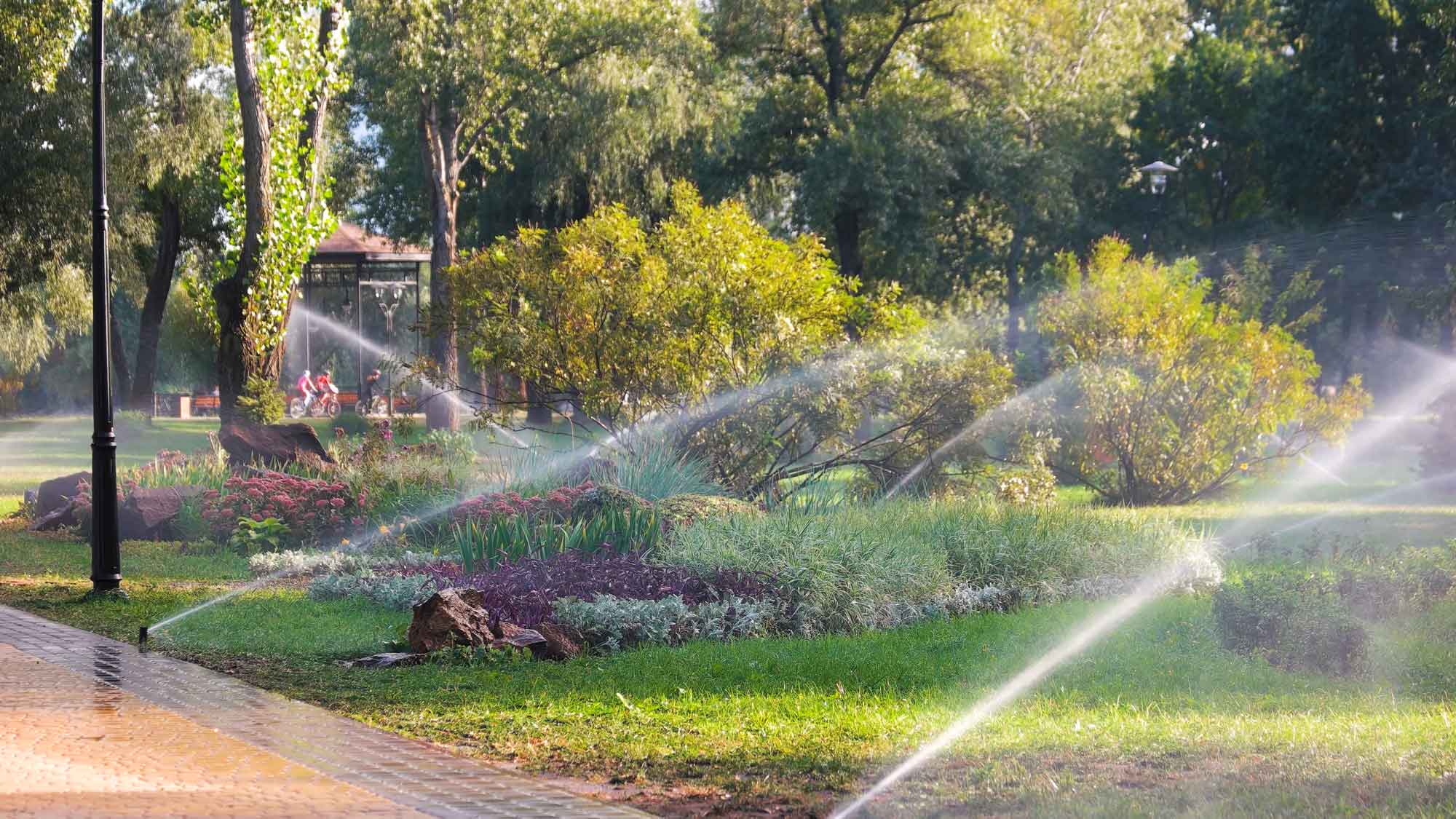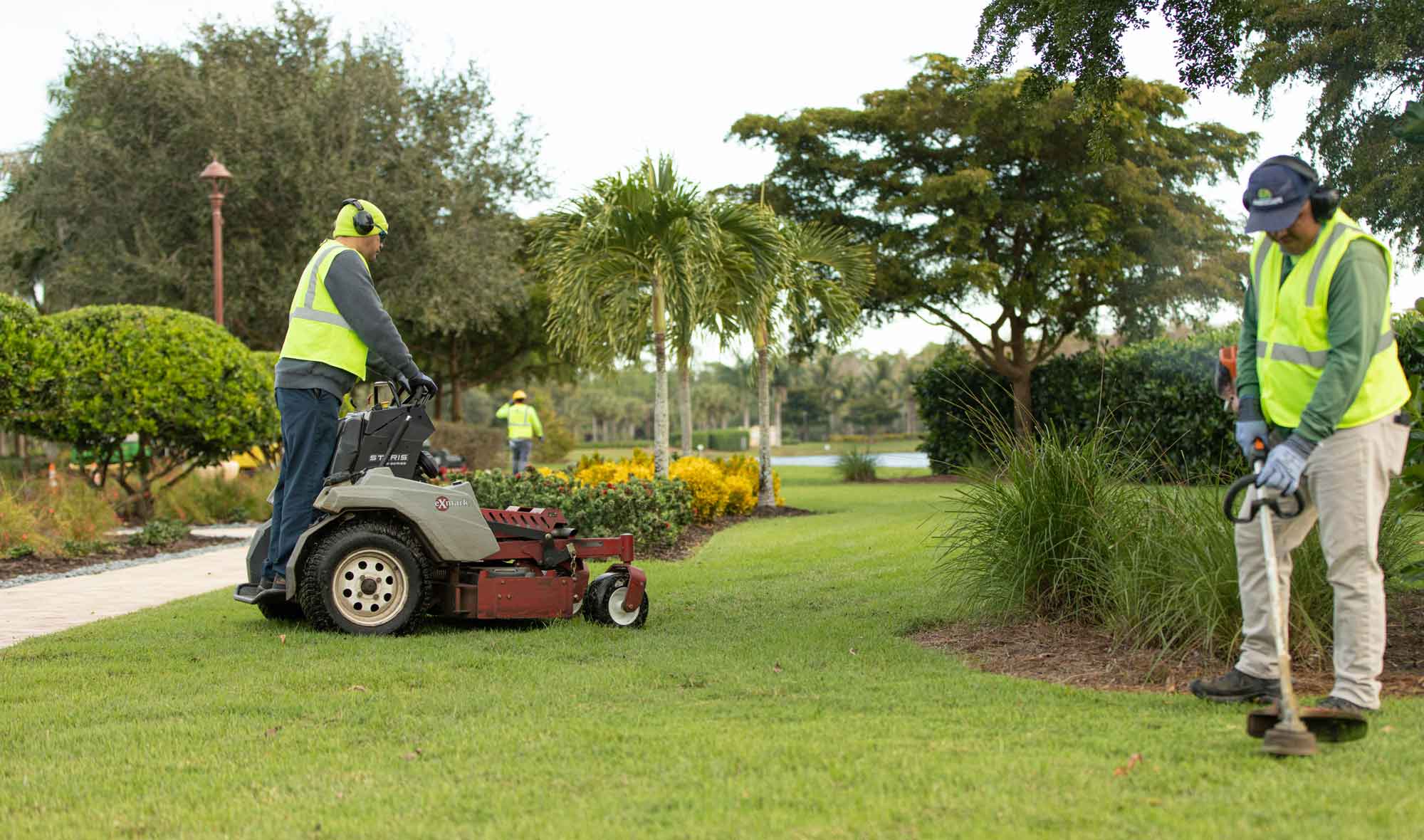3 Essential Steps to Hire a Landscaper
Your house isn’t just a place to rest your head at night. It’s where you raise your children, celebrate holidays and family milestones, and much more. There are few better feelings than returning home on Friday night after a long week and the weekend ahead of you, full of lazy promise.
Unless of course, you notice your yard looks like a jungle. Suddenly, you may be looking at a weekend of labor: weeding, mulching, scrubbing, mowing, and more.
The best way to tackle these big projects and save your weekend is to get professional help. This guide is designed to help you understand how to hire a landscaper. First we’ll analyze the skills of different landscaping professionals, then review the noteworthy certifications you should look out for. Lastly, we’ll identify the key terms and conditions for a contract. Let’s get started!
Lawn and Garden Services Near Me.
1. What Type of Landscaper Do You Need?
Your first step is to figure out what kind of landscaping company you need to hire. Here’s a breakdown of the different landscapers you may be interested in:

Landscape Architects plan and design your landscape. They will discuss your vision for your space and help you to choose appropriate plants and materials for your budget. They will look beyond the current season to plan a yard that will impress all year.
Landscape Designers and landscape architects perform similar jobs, but landscape designers usually don’t have the academic degree required of landscape architects.
Landscape Contractors install your landscape features, including the softscapes, like soil and vegetation, and hardscapes, like fences, water elements, stones, and walkways.
Landscape Managers maintain your landscape. Landscaping isn’t a seasonal project that can be neglected. If you don’t want to take on regular maintenance yourself, you may want to hire a landscape manager.
Horticulturists, sometimes called horticulturalists, are plant experts. If your plants aren’t flourishing, your leaves are being eaten by pests, or you live in a particularly difficult climate for vegetation, you may want to work with a horticulturist. They can also coordinate with landscape architects or designers to plan your gardens.
Arborists plant, prune, remove, and take care of trees. They know about fertilization and nutritional needs, as well as cabling, bracing, and support for newly planted trees. Make sure your arborist is certified by the International Society of Arboriculture (see Section 2 on certifications to learn more).
Regardless of your landscaping needs, you’ll need to sort out two factors before talking to potential contractors. First, set a budget range. You’ll want to have some flexibility when it comes to materials, and certain aspects may cost more or less than you think. You don’t want to hire a landscape designer to plan your perfect yard only to discover that it costs more than you’re willing to spend. If you know the budget upfront, you can set realistic expectations.
Next, consider your timeline. How long are you willing to have your yard look like a work in progress? Unfortunately, gardens don’t grow overnight. If you’re installing a concrete patio or a koi pond, your yard may need to be excavated before construction can begin. That can be a long process some homeowners aren’t willing to go through.
Search for Landscapers Online
What should you look for before you hire a landscape professional? A quick online search will reveal dozens of results for landscaping professionals in your area. You can filter down these results by ensuring that the professionals you talk to meet a few key criteria:

- A solid reputation: Online customer reviews are usually a strong indication of what to expect from a landscaper. You can also check the Better Business Bureau for any complaints.2 Another way to find a company that might work for you is to look for neighboring yards you admire. Ask the homeowners which company they for design or construction. Most people will be thrilled to hear their yard has such appeal, and you’ll get valuable advice!
- A strong portfolio: Take a look at a company’s past work, which is often showcased on its website. Keep in mind that every picture will likely look great, as smart companies won’t post pictures of mediocre work. Instead of focusing on the ‘wow’ factor, look for jobs similar to what you’re interested in. If they don’t have any water features in their portfolio, for example, they may not be the best people to install your fountain, no matter how impressive their other work is.
- Specialization: Many landscaping companies have teams of people to help with your project. Do you want to hire for each task separately, or do you want a firm that can handle everything? The latter is easier to deal with because the members of your landscape team can work together.
- Local experience: You may want to look for local businesses rather than major chains because these businesses will have worked within your specific microclimate, be familiar with local laws and regulations and species of plants most likely to thrive. Local businesses may offer references you can contact, but take them with a grain of salt. A business won’t offer the contact information of any dissatisfied customer.
- A compatible personality: This isn’t something you’ll find on paper, but you’ll want to work with a landscaper you communicate well with. Spend some time with your potential contractor, and make sure they’re interested in learning about your vision and goals. A contractor should come across as professional, knowledgeable, and reliable.
2. Check the Landscaper’s Certifications
Certifications will vary significantly depending on which type of professional you’re hiring, but are important for any professional landscaping project. Below, you’ll find the major associations, degrees, and licenses associated with each type of landscaping professional. All states except Illinois, Massachusetts, Maine, and D.C. require landscape architects to be licensed, and all fifty states (excluding D.C.) require a license before a person or company can use the title “landscape architect.”
CLARB Certification: This is an authority in landscape architecture. A professional can apply for the Landscape Architect Registration Examination (L.A.R.E.) through this board; this test is a prerequisite for certification in most states.
Bachelor of Landscape Architecture (BLA or BSLA): One of these bachelor’s programs in usually required for entry into the profession. Alternatively, a professional may study something different as an undergraduate, but receive a master’s degree in landscape architecture (MLA). If you want to be especially thorough, make sure the program is accredited by the American Society of Landscape Architects.
International Society of Arboriculture: The ISA is the leading authority of arboriculture, with more than 20,000 members globally. All members must pass an exam to join, and renew their certification every three years. The ISA also administers the only international credentials program in the arboriculture industry.
American Society of Landscape Architects: Don’t be confused by the letters after an architect’s name. PLA (Professional Landscape Architect), LLA (Licensed Landscape Architect), RLA (Registered Landscape Architect), or just LA (Landscape Architect) are all acceptable. ASLA asks its members to use PLA, but instead of relying on the jumble of letters, ask any potential landscape designers to spell out their certifications for you. You can also use the ASLA tool to search for certified designers.
Association of Professional Landscape Designers: This association offers the only certification for landscape design in the United States. Don’t just ask if a landscape designer is a member of the association; confirm if they are certified. Only 20% of APLD members have received the certification!
Landscape Contractor Licenses: Most states require a license for landscape contractors. However, the requirements vary, and there is no uniform license all contractors are required to obtain. Make sure whatever contractor you choose is licensed in your state.
National Association of Landscape Professionals: This organization is the largest national trade association of lawn care and landscape professionals. It includes many kinds of landscapers, including architects and designers. Any firm or individual can join, so look for members who have won an Award of Excellence or passed the certification exams.
National Arborists Association: This association for commercial tree care services firms has high standards for arboricultural techniques. Certified members must pass an examination and are committed to continued education.
3. Create a Contract
Once you’ve found a few landscape professionals you’d like to meet with, you’ll want to clarify your needs and define your expectations. The questions you ask will vary depending on your situation, but at least touch on each of these points: Price, Safety and Security, and Quality Assurance.
No matter the conditions of your deal, at some point your landscape becomes your responsibility. You might want to consider hiring a maintenance crew to protect your investment and keep your yard looking pristine. Many homeowners don’t have the time, experience, or inclination to take diligent care of sensitive plants, so it’s better to hire an expert to maintain your landscape than to start over because your plants have died.

Security goes beyond physical safety. You want to be protected if the work is incomplete or unsatisfactory. To ensure that you and the company you hire are on the same page, you must have a contract. A contract should cover many aspects of the job, and, at a minimum, should answer the following questions:
- What is the start date and estimated completion date?
- What work is included? Be specific about each service. For example, if you are having your trees pruned, clarify that any dead branches wider than a certain diameter will be cut back. Or if you’re signing a contract for recurring services, list responsibilities for each season.
- What is the cost breakdown? This may not be part of the contract (unexpected situations can arise, after all), but you’ll definitely want it included somewhere. Each of the services listed in the contract should have an associated cost. Who is paying for materials? Are you paying for the entire job or are you being charged by the hour? Include a ‘Not to exceed…’ statement in your contract to ensure that there is a limit to what you will be charged.
- What is the payment schedule? How much do you have to pay today, and when is the balance due? Is your deposit refundable? Clearly define your terms of completion. You don’t want a landscaper to pack up when you’re expecting more work!
- Who is responsible for obtaining permits? In most cases, the landscaper should be able to obtain permits, but you’ll want this specified in the contract. If you are a member of a homeowner’s association (HOA), it’s your job to make sure that the landscaping fits the guidelines for your community. Get approval before work begins!
- Who is responsible for cleanup? Landscaping is a messy business. Whether you’re getting a tree removed or anything else, your contract should clearly state the cleanup responsibilities of both the homeowner and the contractor.
- What are your guarantees? If something breaks, doesn’t work, or doesn’t bloom, what are your options? Perhaps the landscape contractor will replace a plant if it dies within six months, or the contractor will agree to perform periodic checks on your garden to ensure that everything is healthy, pest-free, and well-maintained.
Conclusion
Before signing any kind of contract, verify that the professional is in good standing with any professional organizations he or she claims to be involved in. It is also essential you follow up with the insurance companies, as working with an uninsured firm could cost you thousands of dollars if something goes wrong.
Lastly, go over every detail of the contract and make sure you understand each point before you sign. Due diligence now will save you time, money, and stress in the future.
There are many reasons to hire a landscaper, most notably that your yard is a constant work in progress. If you want to tackle it alone, you need a lot of time and expertise. For many homeowners, hiring a local expert is an affordable and superior option to make your yard beautiful and easy to maintain for years to come!
From: Expertise.com